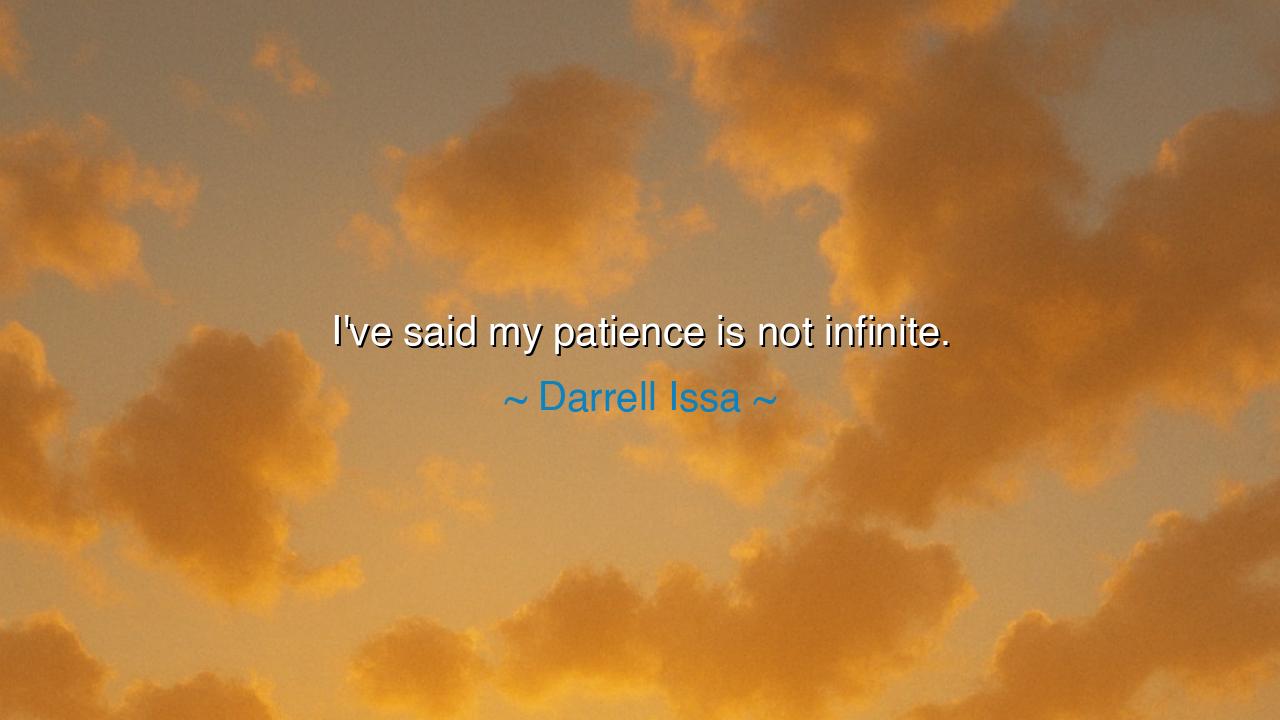
I've said my patience is not infinite.






Hear, O listeners, the stern words of Darrell Issa: “I’ve said my patience is not infinite.” In this utterance lies a truth as old as time itself—that even the most enduring spirit has its limits, and that endurance, though noble, cannot be stretched without end. For while patience is a virtue, infinite forbearance becomes folly, and wisdom demands that there be a moment when the heart draws its line, when the soul declares, “No further.”
From the beginning, men and women have wrestled with the tension between waiting and acting. The farmer knows to wait for rain, but if the sky gives none, he must seek new ways to water his field. The ruler may suffer the stubbornness of rivals, but if deceit persists, he must act to defend his people. So too Issa, in politics and in leadership, spoke not of anger but of warning: that his willingness to endure delay and deception was not without boundary. His words echo the wisdom of the ancients: that patience must be joined with justice, lest virtue become weakness.
Consider, O seekers, the story of Abraham Lincoln. For long he bore the divisions of his nation, hoping compromise might preserve the Union. Yet when patience proved no cure for the spreading fire of slavery and secession, he acted with resolve, summoning armies and reshaping the destiny of a people. His endurance was great, but it was not infinite, for he knew that there comes a time when patience must yield to duty. His legacy shows us that strength is not only in waiting, but in knowing when waiting must end.
The meaning of Issa’s words is not merely political, but universal. In every human life, there are times when one’s generosity of spirit is tested—by betrayal, by injustice, by neglect. To say “my patience is not infinite” is to remind both oneself and others that respect must flow both ways, that endurance cannot exist without accountability. It is a call to seriousness, a warning that the hour of reckoning approaches when forbearance is exhausted.
Yet let us not despise patience, for it is still the root of wisdom. The hasty spirit destroys itself, and the reckless hand brings ruin. But let us also not idolize patience to the point of passivity, where wrongs are tolerated until they calcify into chains. Balance is the law of life: patience to endure what must be endured, and firmness to act when the hour demands. Issa’s words remind us of this balance, that virtue lies not in infinite delay but in measured endurance that leads to decisive action.
The lesson for you, O hearers, is this: set boundaries in your patience. Be slow to anger, but do not be endlessly silent before injustice. Be forgiving, but do not let yourself be endlessly deceived. Recognize that patience is most noble when it is purposeful—when it leads to growth, to understanding, to peace—but becomes weakness when it excuses harm. To live wisely is to know when to wait, and when to rise.
Practical steps are plain. When others test your patience, ask yourself: is this endurance strengthening me, or is it draining me? Set limits with kindness, but also with clarity. When you forgive, let it be true forgiveness; but if betrayal continues, act with courage. In work, in family, in public life, let your patience be strong, but let it also have its righteous end. For in such balance lies the dignity of a life lived wisely.
Therefore, O children of tomorrow, remember Darrell Issa’s words: “My patience is not infinite.” Take them not as bitterness, but as a reminder of the ancient law: that to endure endlessly is to invite injustice, but to endure wisely is to preserve both honor and peace. Let your patience be steadfast, but let it also have a boundary, and when the moment comes, act with strength. For in this balance lies the true greatness of the human spirit.






AAdministratorAdministrator
Welcome, honored guests. Please leave a comment, we will respond soon